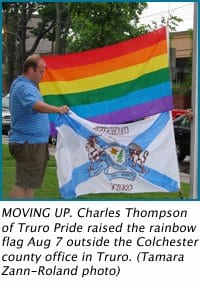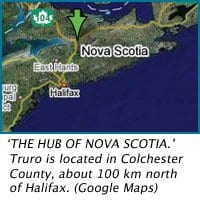Truro, Nova Scotia’s town council overwhelmingly voted Aug 3 against raising a pride flag outside town hall.
But Colchester County Mayor Mike Smith welcomed queers to raise the flag at the regional building in Truro this morning, Aug 7. A small group of people braved the rain to watch Charles Thompson of Truro Pride raise the flag.
Truro town council’s decision last week appeared to reflect puzzling views about gays and lesbians.
Truro Mayor Bill Mills told the CBC on Aug 3, “If I have a group of people that says paedophiles should have rights, do we raise their flag too?” According to the Halifax Chronicle Herald on Aug 7, he also says his belief in the Bible makes it difficult for him to support gay pride.
Councillor Sharron Byers told the Truro Daily News on Aug 4 that she voted against raising the flag out of “respect for their [queer] lifestyle choice.” She said her queer friends who have “chosen this lifestyle” are humiliated and demoralized by rainbow flags and pride parades.
But Truro council’s actions likely violated Canadian and Nova Scotian human rights legislation, both of which protect against discrimination based on sexual orientation. In neighbouring New Brunswick, a human rights case from 1998 concluded that a town council could not refuse to proclaim a gay pride weekend.
“If the proclamation is not made, it would have potentially far-reaching consequences in terms of the acceptance of homosexuals by others in the community and in terms of their own self-esteem,” the board of inquiry declared.
Charles Thompson was angered by Truro council’s decision and confronted the mayor directly.
Thompson says the mayor’s reaction to his questions was to go on a “religious tirade” and ask if Thompson had accepted Jesus in his life.
“I thanked the mayor for refusing to fly the flag and for voicing his religious views. It really motivated people to come out and support us,” he says.
Thompson says the town of 12,000 doesn’t have much of a gay scene. There are no gay bars, and the town’s queer social group has had low attendance in recent weeks.
But the flag incident has brought the community together, Thompson says. On Aug 6, over 100 people showed up at Truro’s Victoria Park to rally against council’s decision.
Thompson says the irony is that if council had simply allowed the flag to be flown, some people may have grumbled and no one would be talking about Truro.
Instead, the council’s decision has drawn international attention. All major Canadian news broadcasters covered the story, and bloggers from around the world have written on the subject.
“There is some good coming out of this,” says Bonnie Joldersma of the Northern AIDS Connection in Truro. She says several local religious leaders attended Monday’s rally, and they disagreed with the mayor’s use of the bible to discriminate against gays.
Thompson says it’s important for the flag to fly as a sign that the city is a welcoming place for all people. While growing up gay in Truro, he says, he felt isolated and had a hard time. “I don’t want other people to go through that. I want people to feel that this is a town where people can feel open.”
With all of the interest surrounding the incident, Thompson says he hopes that the momentum will continue to next year so they can host Pride events and possibly a parade.


 Why you can trust Xtra
Why you can trust Xtra


